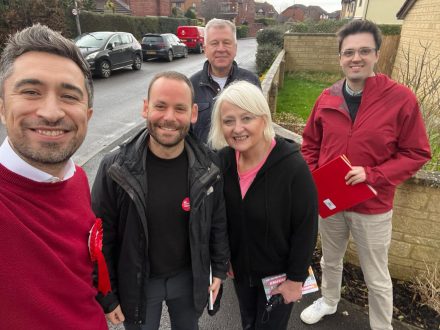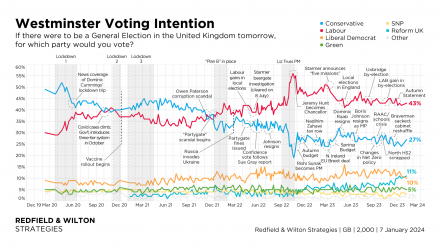
After a testing week, Labour has come roaring back with two thumping byelection wins in Kingswood and Wellingborough, the latter with the second highest swing from Conservative to Labour since 1945.
Keir Starmer now holds arguably the best by-election success record of any post-war Labour leader (seven gains and only the one early loss in Hartlepool in 2021), and the opinion polls have been steady at a Labour lead of 15 to 20 points.
With over 800 days since the last Tory poll lead, it would be all too easy for Labour members to assume a General Election victory is in the bag, and only the size of the landslide needs to be measured.
By-election wins risk some activists sitting back assuming victory
In these circumstances there’s a significant risk of complacency setting in, some potential activists deciding to sit back and watch the stroll to victory on TV rather than burning shoe leather.
There’s a risk too that others decide HQ has got its targeting too modest and throw all their energy into trying to gain the nearby safe Tory seat, rather than the further away official “battleground” marginal.
We need to avoid declaring victory prematurely before a single general election vote has been cast.
The poll leads and byelection gains are extremely welcome and help sustain morale and momentum, but they are not a prediction of what will happen when the general election comes.
Labour’s challenge is still unprecedented
The scale of the task Labour faces hasn’t changed and is still an unprecedentedly difficult one.
We have to go from a pitiful 202 seats in 2019 to 326 for a majority, and rather more for a majority that is comfortable and sustainable. Our starting position is actually a few seats worse due to boundary changes, too.
Matching former prime minister Tony Blair’s stunning 146 gains from 1997 doesn’t take us to landslide territory this time; it takes us to a workable but not emphatic 348 seats.
We need 69 gains just to get to the same start line Blair had, so much further back are we starting.
We have far more seats to target than New Labour did

This brings its own challenges in terms of targeting.
In 1997 New Labour had only 91 key seats that were “must-wins” that it targeted with central party resources. If we targeted only 91 seats this time, we could win them all and still be 33 seats short of a majority.
We therefore have far more designated “battleground” seats now. But resources are finite. We only physically have one eader and one set of shadow cabinet members, there is a limit to how many seats they can visit.
Legal spending limits and the limitations of our own fundraising mean we have a finite amount of money for organisers and direct mail.
We can grow the number of volunteers we have, and the amount of work they each do, but the more seats we try to fight intensely, even assuming a completely disciplined volunteer workforce that will go the seats the party asks them to work in, the more thinly we will be spreading them.
GE resources in each seat won’t match by-election resources
We need to all be acutely aware that the gains we have won in by-elections were partly down to political messaging and popularity, but also down to sheer organisational heft.
In a by-election you can spend up to a £180,000 legal limit, pump in staff, often entire regional teams, and send volunteers from across the country, as there are only one or two seats up on the same day.
In a general election, all 650 seats are up. Even battleground seats will be lucky if they have one member of staff, a few dozen activists, and spending limits are nearer £10,000 than £180,000 per candidate (they vary depending on the number of electors).
The searing political and organisational experience of my youth was not the wonderful 1997 landslide, it was campaigning in the 1992 defeat in Bristol North West, a seat we lost after multiple recounts by only 45 votes.
One extra activist could have found us the 46 votes that would have gained us a Labour MP. If that had happened in another 10 ultra-marginals, we would have ended Tory rule five years earlier than we did.
Extra doors you knock now could be the difference
So, take heart from Kingswood and Wellingborough but don’t lose sight of the hard slog that will be needed to deliver a majority Labour government.
Every time you get a call or email asking you to trek to a battleground seat, take it seriously and please go, those extra doors you knock or street you deliver leaflets to could be what makes the difference between a Labour government and five more years of Tory misrule.
Don’t end up watching the results come in, seeing a Tory MP hold on, and thinking, “if only I’d gone there when they asked me to”.





More from LabourList
A year in power: The cabinet on their proudest wins and favourite moments
‘One year on, Labour still hasn’t reckoned with collapsing trust in politics’
‘I’m the Labour MP who beat Liz Truss. Here’s how the campaign to unseat her unfolded’